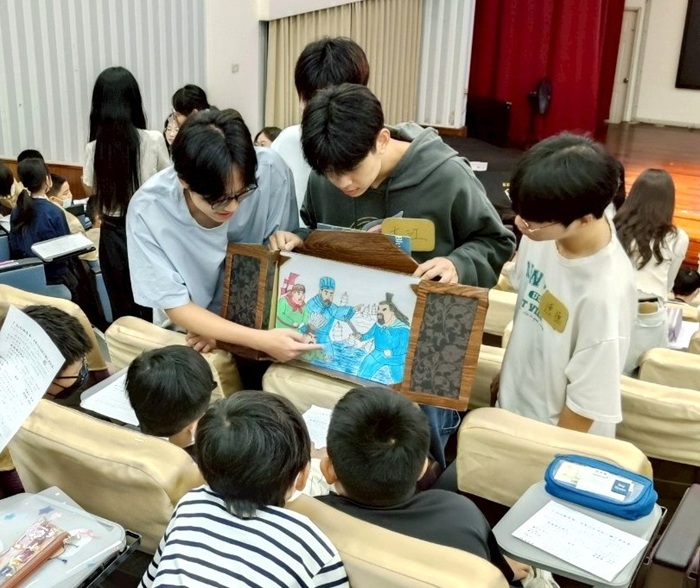Could college students’ final grades be determined by elementary school students? In the course “Chinese Reading, Critical Thinking, and Expression” offered by College of General Studies instructor Wei-Jen Chen at Yuan Ze University, 60 students from the School of Nursing, Department of Electrical Engineering, and College of Management participated in a creative and practical project. They visited Yuansheng Elementary School and used the traditional Japanese storytelling method “kamishibai” to vividly narrate classic stories from Romance of the Three Kingdoms, showcasing the results of intergenerational collaborative learning.
Professor Chen explained that in the age of information and media, language courses were no longer just about acquiring knowledge, but about expression and communication—especially understanding the audience’s needs and conveying content effectively. This collaboration with Yuansheng Elementary School allowed university students to step out of their comfort zones, develop cross-generational communication skills, and fulfill their teaching objectives through storytelling.
Kamishibai, originating from Japanese folk culture, involved a performer using a wooden box resembling a small theater and a stack of illustrated cards, switching them while narrating the story—much like a storyboard—to attract audiences. It was a popular multimedia storytelling format before the advent of television. After a semester of preparation, Yuan Ze students selected ten stories from Romance of the Three Kingdoms, wrote scripts, and created props.
Teachers at Yuansheng Elementary guided students to pre-read the novel, appreciate the performances, and establish evaluation criteria. Each university student group first performed in the audiovisual room, where six elementary students conducted the initial round of judging. They then performed in each third-grade class. The winning group, which performed “Empty Fort Strategy,” gave a grand performance for sixty students. All ten groups were warmly received, and the atmosphere was lively.
Yuan Ze University nursing student Yi-Hsuan Lin shared that the experience was unforgettable. When they entered the classroom to perform, they were greeted by the eager eyes of the children, which was deeply moving. Yuansheng student Pin-Yo Huang said the illustrations were vivid, the plot immersive, and the voice acting conveyed the characters’ emotions. The story of “Wooden Ox and Gliding Horse,” where the Shu Kingdom used Zhuge Liang’s clever strategy to defeat Wei, left a lasting impression and made them want to watch it again.
Yuansheng Elementary’s reading promotion teacher Shih-Han Lee noted that the activity taught students not only how to listen and appreciate storytelling techniques but also how to act as professional judges by giving scores and feedback. Although the process was intense and busy, the students were fully engaged and reluctant to leave—this was the charm of storytelling and the spark of mutual learning between older and younger students.
Professor Chen concluded that this cross-school, cross-disciplinary, and cross-generational teaching innovation not only fostered interactive learning between students but also received high praise from Yuansheng Elementary. The school had already invited Yuan Ze University to continue the collaboration next year, hoping that this “Yuan-Yuan” encounter would continue to plant the seeds of reading and creativity, helping more children grow through the world of stories.


 En
En  繁
繁